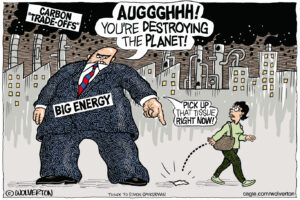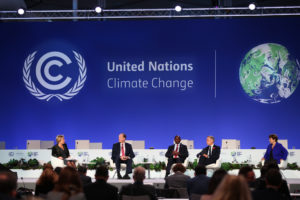The World’s Great Cities Hold the Key to Fossil Fuel Cuts
The great urban centers, hotspots of global wealth creation, are major emitters of greenhouse gases. Civic leaders could be among those best placed to save the planet. Market in Lagos, Nigeria: Cities are wealth creators. (Zouzou Wisman / Wikimedia Commons)
Market in Lagos, Nigeria: Cities are wealth creators. (Zouzou Wisman / Wikimedia Commons)
Governments anxious to reduce the national use of fossil fuels and limit climate change now know where to start: in the great cities. New research has confirmed what with benefit of hindsight should have been obvious – that the 54% of humanity that lives in the cities now accounts for more than 70% of global energy use.
And a new study of the so-called “carbon footprint” of 13,000 of the world’s urban areas has identified the most effective places to start. “The top 100 highest footprint cities worldwide drive roughly 20% of the global carbon footprint,” said Daniel Moran, of the Norwegian University of Science and Technology.
“This means concerted action by a small number of local mayors and governments can significantly reduce national carbon footprints.”
Matching information
Dr Moran and colleagues from Japan, the US and Sweden report in the journal Environmental Research Letters that they defined cities as densely populated, contiguously built-up urban areas, often straddling administrative boundaries. From space, Manchester and Salford in the UK would look like one city; Manhattan and Brooklyn, in the US, or Tokyo and Yokohama in Japan, would fade into each other.
The researchers then matched all the information they could find about existing carbon footprints – estimates of energy consumption – with national statistics on spending patterns, regional purchasing power data and a population map.
Cities – historic concentrations of people, business, industry, government, legislation, learning and inventiveness – are also concentrations of economic growth: 600 urban centres are thought to account for about 60% of global gross domestic product.
Cities may drive climate change, but they are also concentrations of people who will be most at risk, not just because cities are hotter than the surrounding countryside, but because, as the world warms, more people in more cities become increasingly vulnerable to extremes of heat and flood.
The message of the study is simple: when it comes to reducing fossil fuel use, carbon footprint and emissions of greenhouse gas, mayors, governors, councils and city bosses have as much opportunity as national governments – and more direct influence.
The scientists assembled their list of 13,000 cities from data from 187 of the world’s nations. Altogether 195 nations in 2015 in Paris agreed to work together to contain global warming, driven by fossil fuel use and consequential increases in atmospheric carbon dioxide, to, if possible, no more than 1.5°C above historic levels by 2100.
In fact, the world has already warmed by around 1°C on average in the last century: the challenge is to act in time to stop global warming rising to catastrophic levels.
Several surprises
And the new study delivers some useful places to begin. The top 100 cities are home to only 11% of the world’s population but drive 18% of the global carbon footprint.
The top three – Seoul in Korea, Guangzhou in China and New York in the US – are no surprise, but other metropolitan areas with unexpectedly large carbon footprints include Cologne in Germany, Manchester in the UK and Montreal in Canada.
Of the top 200, 41 cities – and these include Cairo in Egypt, Dhaka in Bangladesh and Lima in Peru – are in countries where both total emissions and emissions per head are low. But many of the world’s most carbon-intensive cities are in the world’s richest nations: that is, their civic authorities have the resources with which to act.
“The fact that carbon footprints are highly concentrated in affluent cities means that targeted measures in a few places and by selected coalitions can have a large effect covering important consumption hotspots,” said Dr Moran.
Your support matters…Independent journalism is under threat and overshadowed by heavily funded mainstream media.
You can help level the playing field. Become a member.
Your tax-deductible contribution keeps us digging beneath the headlines to give you thought-provoking, investigative reporting and analysis that unearths what's really happening- without compromise.
Give today to support our courageous, independent journalists.






You need to be a supporter to comment.
There are currently no responses to this article.
Be the first to respond.